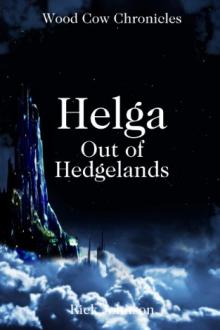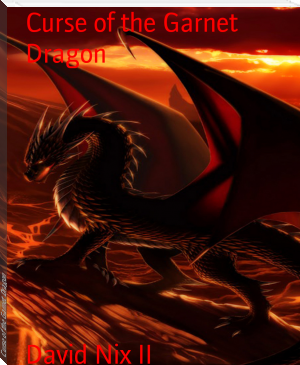Helga: Out of Hedgelands by Rick Johnson (ebook reader color screen .txt) 📖

- Author: Rick Johnson
- Performer: -
Book online «Helga: Out of Hedgelands by Rick Johnson (ebook reader color screen .txt) 📖». Author Rick Johnson
“I can see you are a brave and capable beast,” Helga replied. “But you have no idea how dangerous it is in the Borf lands.”
“I don’t care about the danger,” the Lynx said firmly. “I have heard that just across the Borf lands lies the Woods Blow Wad, a vast forest wilderness I have visited many times. Once I get there, I can find my way to the main Hedgeland roads and get back on my way.”
“WOODS BLOW WAD!” Helga exploded. “YOU KNOW THE WAD? YOU’VE BEEN THERE MANY TIMES? DO YOU KNOW ANY WOOD COWS?” Helga could not believe what she was hearing. The Wood Cows frequented Woods Blow Wad—locally known as simply ‘the Wad’—because it had some of the finest wood in the Hedgelands. “HAVE YOU MET WOOD COWS IN THE WAD? DO YOU KNOW BREISTER? EMIL? HAVE YOU HEARD OF HELBARA?” Helga shot the questions out in a stream of excitement.
“Whoa, there, friend,” the Lynx replied. “Yes, I know the Wood Cow clan well. As a wee Lynx, I spent a lot of time in the Wad because it’s got fabulous rocks for climbing practice. And, yes, I know Breister and Emil. I came across them in the Wad one day and I helped them move some wood they had collected and we’ve met a few other times as well.”
Helga was so excited she could not contain herself. And, that excitement carried her all the way up Fool’s Gap, over the Smothercap, and across the Borf lands with her new-found Lynx friend. Soon after, she and the Lynx found Breister and Emil collecting wood in the Wad. So it was that, after a seven year absence, Helga was reunited with her family at O’Fallon’s Bluff.
~ ~ ~
Breister smiled as he recalled the story of Helga’s return to her family three years ago.1 The story gave him hope that the Drownlands Cutoff Weekly might once again play a role in reuniting him with his beloved daughter.
Annie’s Story
For a long time, the three friends rattled along silently, dozing, fidgeting, and gazing out the window. Breister, however, noticed that Annie seemed to be preoccupied—softly singing a song over and over. Her eyes were closed and her head moved gently as if in rhythm with some inner music. Although her lips moved, only by listening intently could Breister catch the words Annie sang:
There was an old salt a-going to sea,
But his jolly good ship, not a sail had she,
He took his red nightshirt, cook’s apron, ’n mate’s socks,
And with the crew’s noserags, sailed away from the docks.
A-sailing, a-sailing,
Sailing over the sea,
What a fine sailor—NAY—fine tailor, was he!
With a smile playing across her face, Annie repeated the song, sometimes singing the verse, other times, just humming the tune. Breister watched her with puzzlement. This was another unexpected side to the hardened bandit. Beneath her scars and fierce appearance, there was someone who knew silly songs. What was Annie’s story? There was more to the Cougar than he yet knew, Breister realized.
Drawn far into his own musings by Annie’s curious reverie, Breister did not notice he was staring at Annie, until the Cougar spoke, startling him. “What are you gaping at? Never heard a sea shanty before?” Annie teased playfully.
Embarrassed to have been caught stupidly staring at his friend, nevertheless, Breister’s curiosity pushed him on. “I thought it was a sea shanty,” Breister replied, “but I never knew you had gone to sea.”
“No, I’ve never been on a ship,” Annie smiled. Closing her eyes again, she seemed to return to the inner world somehow related to the sailors’ rhyme...
A-sailing, a-sailing,
Sailing over the sea...
For some minutes, neither of them said anything more. Deciding not to pursue the subject further, Breister turned to watch the countryside pass by.
Then Annie spoke: “My mother, Bram Dorothea, taught me the song,” she began. “She went to sea for one voyage, and it strongly affected her. The verse came from the happy days she spent aboard ship. All that talk about family got me thinking about her.”
Breister’s curiosity was now greatly aroused. “Annie, you have to tell me more,” he pleaded. “I feel like we’ve become close friends—and I’ve been wondering about your family. I guess you and your mother must have been close. What happened to her?”
Annie looked away from Breister, as if gauging how much more she wanted to say. Then, making up her mind, she woke up Toshty. “Brighten up your bulb, old fellow, you won’t want to miss this,” she said, lounging back comfortably into her corner of the compartment. Roused from his sleep, Toshty blustered about “so-called friends that spoil perfectly good naps,” but was quieted by a motion from Breister, who sensed that Annie was readying herself to tell a story.
“Bram grew up in the Estates of the Norder Wolves,” Annie began. “It is a beautiful land. Majestic, forbidding mountains surround the Estates, but give way to a flat coastal plain where most of the inhabitants live. The farmland along the coast is rich and produces abundant crops. My mother used to tell me stories about how, when she was small, her family’s storage barrels overflowed with corn, yams, and vegetables. Although there were fourteen in the household—she had seven sisters and four brothers—they had plenty to eat at first.
“The Estates produced bountiful crops, but Bram’s family had a precarious life. They depended on the Bunge-Hoedt—or ‘the Bunge’ as it was commonly called. Under Norder Law, some designated land—the Bunge-Hoedt—was set aside for the common laboring beasts to use. All Estate lands belonged to the Barons of the Estates, who, by ancestral right, were Norder Wolves. Norder Law required the commoners—the Bungeons—to serve their Baron and work his lands. In return, they were allowed to work the Bunge. Bungeons normally had large families so that there were hands enough to work both the Baron’s lands and their own land as well.
“Bunge-Hoedt means, literally, ‘magic lands,’” Annie continued. “They are called ‘magic lands’ because they appear and disappear like magic! A mighty river, the Urrannay, flows down out of the mountains and meanders through the Norder Wolf Estates before emptying into the Great Sea. Every spring, snowmelt from the mountains and spring rains cause awesome flooding along the Urrannay. The floods pile up silt and leave behind a multitude of small, temporary islands in the river. These islands are the Bunge-Hoedt. The silt gives the islands very fertile soil, so they are good for farming, but the same floods that give these ‘magic lands’ can also take them away. Some islands last many, many years. The best of the Bunge lands remain stable for decades, but many come and go in a single season. As the islands come and go, Bungeons must move about, hopping from island to island, scratching out their sustenance.
“In olden times, and even while mother was a young beast, the Bungeons, by hard work, lived simply, but well. Then, the Barons began usurping the most stable Bunge-Hoedt islands for their own use and adding them to their Estates. The common beasts were left with only the most temporary, least stable islands. As the Barons’ claims expanded, the Bungeons spent more and more time working for the Barons, and had less desirable land to farm for their own needs. Smaller and less productive lands soon reduced the common farmers to dire poverty and want.
“Where there had been rich fields of corn and yams, there were now bare patches of poor barley and coarse peas. The good common feeling and mutal concern, of the ancient times, between the Barons and their Bungeons withered. The Barons went about in fine silk, while mother’s family sometimes boiled their shoes with grass to make soup.
“In spite of their troubles, Bram’s cottage had one wealth that Barons might die for, had they knowledge of it. The cottage, with only one poor window, an empty pantry, and rarely a set of clothes without patches, still and all had fourteen loving hearts and educated minds. If Bram’s family was poor in the ways of the world, they were rich in ‘the wealth that cannot be taken or taxed,’ as Mother used to say.
“Bram’s parents decided that, ‘If we be poor and hungry, our children will not be beggars in their minds!’ They taught each of their young beasts to read and learn all they could. They believed that reading was worth more than sitting outside some great Baron’s door begging for onions. ‘What is in your mind and heart is the only thing that is surely and truly yours,’ my mother learned. ‘Gain all you can of mind and heart and no moth or Baron can take it!’ Each night, the few books they could gather were read again and again by candlelight. During the long winter’s nights, they made plays—creating entire fantastic worlds—out of those few bare books!
“This was the secret of Bram Dorothea. This was the secret that gave her a life instead of starving humiliation. This is the secret that gave me a mother rather than a slave to the Baron.
“When Bram Dorothea was sixteen, things grew especially desperate in the Bunge. One year a terrible drought killed many of the crops. The next year it rained too much and more Bunge lands than usual were swept away by flooding. Bram Dorothea and her twin brother, Rideon Morgan, decided to set off on their own and leave the Estates of the Norder Wolves forever.
“They resolved to sign on as crew of a sailing ship—Dainty’s Shant—bound across the Great Sea. Rideon had met a sea captain who told him that there was work for young beasts in the newly opened lands across the Great Sea. ‘Yes, Bram,’ Rideon said, ‘Captain Ord says that I can easily get work and you can teach school in Port Newolf!’ Excited and hopeful, they signed on to Captain Ord’s crew.
“Bram and Rideon crossed the Great Sea cleaning and serving for their keep on Dainty’s Shant. Bram taught some of the sailors to read. She loved to teach reading. It felt like she had found a life for herself. She talked constantly about her dream of becoming a teacher when they reached port. She and Rideon were happy.
“When I was just a young bit of a Cougar, mother used to play a game with me that recalled those happy days that were such a turning point in her life.” Annie paused for several moments, once again returning to the memories that had stimulated her to tell her story.
Then she continued: “We would create a make-believe deck of the Dainty’s Shant, and mother told me wonderful yarns. I especially liked the stories about the ship’s carpenter, Klemés ma di son Colé. He taught mother the song I was singing. Mother described him as a weathered old salt—a stocky Wood Cow of medium height, with a bulge of fat around his belly. He had a leathery, sunburned nose and twinkling eyes under heavy lids. Mother made me laugh with her impersonations of him—especially his ‘stormy’ voice. Klemés taught Bram and Rideon how to trail fish lines from the stern of the ship and played impromptu concerts on his flute. He taught them dances with loud stomping and singing, and such antics irked Captain Ord a good deal. Mother said that, one night, the good Captain—fuming in his nightshirt—threatened to spike the deck with nails if the stamping and hollering continued! She said that everyone had a good laugh, but cut the noise immediately.
“All in all, Captain Ord was a good and





Comments (0)